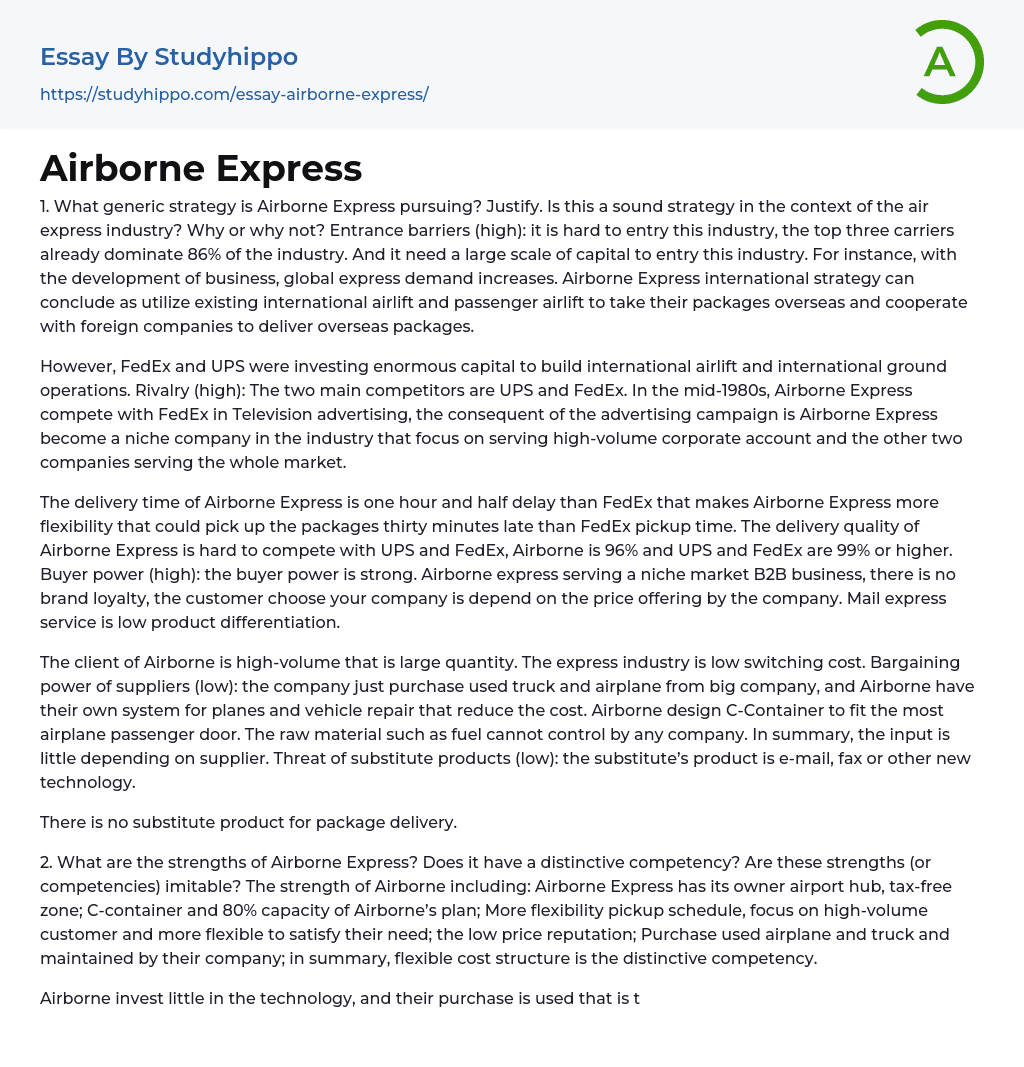1. What generic strategy is Airborne Express pursuing? Justify. Is this a sound strategy in the context of the air express industry? Why or why not? Entrance barriers (high): it is hard to entry this industry, the top three carriers already dominate 86% of the industry. And it need a large scale of capital to entry this industry. For instance, with the development of business, global express demand increases. Airborne Express international strategy can conclude as utilize existing international airlift and passenger airlift to take their packages overseas and cooperate with foreign companies to deliver overseas packages.
However, FedEx and UPS were investing enormous capital to build international airlift and international ground operations. Rivalry (high): The two main competitors are UPS and FedEx. In the mid-1980s, Airborne Express compete with
...FedEx in Television advertising, the consequent of the advertising campaign is Airborne Express become a niche company in the industry that focus on serving high-volume corporate account and the other two companies serving the whole market.
The delivery time of Airborne Express is one hour and half delay than FedEx that makes Airborne Express more flexibility that could pick up the packages thirty minutes late than FedEx pickup time. The delivery quality of Airborne Express is hard to compete with UPS and FedEx, Airborne is 96% and UPS and FedEx are 99% or higher. Buyer power (high): the buyer power is strong. Airborne express serving a niche market B2B business, there is no brand loyalty, the customer choose your company is depend on the price offering by the company. Mail express service is low product differentiation.
The client of Airborne
is high-volume that is large quantity. The express industry is low switching cost. Bargaining power of suppliers (low): the company just purchase used truck and airplane from big company, and Airborne have their own system for planes and vehicle repair that reduce the cost. Airborne design C-Container to fit the most airplane passenger door. The raw material such as fuel cannot control by any company. In summary, the input is little depending on supplier. Threat of substitute products (low): the substitute’s product is e-mail, fax or other new technology.
There is no substitute product for package delivery.
2. What are the strengths of Airborne Express? Does it have a distinctive competency? Are these strengths (or competencies) imitable? The strength of Airborne including: Airborne Express has its owner airport hub, tax-free zone; C-container and 80% capacity of Airborne’s plan; More flexibility pickup schedule, focus on high-volume customer and more flexible to satisfy their need; the low price reputation; Purchase used airplane and truck and maintained by their company; in summary, flexible cost structure is the distinctive competency.
Airborne invest little in the technology, and their purchase is used that is try to reduce cost. The international strategies of Airborne is using other company airplane or passenger’s airplane and cooperate with foreign company, not as like UPS and FedEx. The biggest two competitor is hard to imitate Airborne model but some small company is easy to imitate.
3. What are Airborne’s weaknesses? Airborne’s weaknesses include: Niche market but rivals servicing whole market; it doesn’t express residential interest.
FedEx and UPS stringent time provisions, they provide earlier overnight grantee delivery than Airborne; FedEx
and UPS provide more quality service than Airborne, FedEx and UPS with large capital to operate international business compare with Airborne, so they can easily control the cost and quality of the service reduce the probability of drop the packages; UPS and FedEx occupied more market share than Airborne; UPS and FedEx invest new technology.
4. Is Airborne’s strategy of trying to diversify its product offering to include logistics services for clients wise?
Why or why not? In my opinion, it is wise to diversify logistics. With the development of company, the new service provides is necessary to extend the capability of the company. Airborne has the advantage that its own airport hub to build stock exchange facility. The management strategy make the company reduce cost. The demand of customer makes Airborne to provide this service. I cannot rebut that the logistics services face the hard competition, however it can efficient use the facility they already have like ground delivery service and air delivery service.
- Advertising essays
- Audience Theory essays
- Competitor Analysis essays
- Consumer essays
- Marketing Management essays
- Marketing Mix essays
- Marketing Plan essays
- Marketing Research essays
- Marketing Strategy essays
- Point Of Sale essays
- Price essays
- Procurement essays
- Product essays
- Product Differentiation essays
- Promotion essays
- Promotion And Marketing Communications essays
- Retailing essays
- Trademark essays
- Anheuser-busch essays
- Brands essays
- Detergent essays
- Product Placement essays
- Research Design essays
- New Product Development essays
- Advertisement essays
- Brand essays
- Sales Promotion essays
- Advertising campaign essays
- Consumer behaviour essays
- Offer And Acceptance essays
- Wal-Mart essays
- Discover essays
- Competition essays
- Effective Leadership essays
- Leadership Styles essays
- Public relations essays
- Planning essays
- Mission Statement essays
- Outsourcing essays
- Swot Analysis essays
- Business Analysis essays
- Business Plan essays
- Strategic Management essays
- Strategic Planning essays
- Reasoning essays
- Community Development essays
- Negotiation essays
- John Locke essays
- 9/11 essays
- A Good Teacher essays




